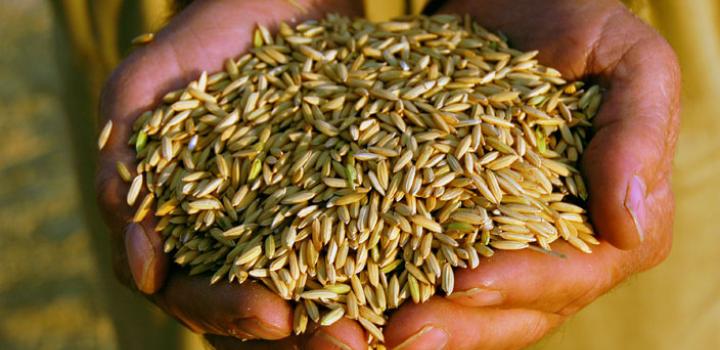Rice farmers face turbulent 2022
by February 8, 2022 12:44 pm 1,487 views

U.S. agricultural commodity prices have been on the rebound, but at least one – rice – is still in a turbulent patch, USA Rice President and CEO Betsy Ward said during the Arkansas Rice Farmers and Arkansas Rice Council annual meeting held Tuesday (Feb. 8) in Jonesboro. Rice prices have been better, but explosive input costs, unfair world trade practices, and a lack of policy making in Washington D.C. threaten rice farmers, she said.
“Crops are rebounding … rice is not recovering as fast,” she said. “Rice is different from other commodities. It has different challenges.”
Gov. Asa Hutchinson served as the keynote speaker at the event. Arkansas remains the top rice producing state in the country. About 48% of the rice grown on U.S. soil comes from the Natural State. It’s a $1.3 billion industry each year. Rice is the second largest export crop for the state with a value of $742 million. There are an estimated 1,800 rice farms in Arkansas and the crop is grown in 40 counties, he added.
“I want to thank you for keeping our food supply going during the pandemic,” he said. “Farmers stepped up every step of the way.”
A grim reality is setting in for many in the farm industry that input costs are going to be significantly higher in 2022, Ward said. With an evenly divided Congress, it’s unlikely relief will be coming from the federal government anytime soon, she said.
“Getting anything passed in Washington D.C. right now is going to be tough,” she said.
She noted the Joe Biden administration has tried to focus on climate change policies that will impact the way farmers are able to grow crops. Ward said there has been no cohesive attempt to open trade markets around the world, especially in China.
Hutchinson said he talked to U.S. Agriculture Secretary Tom Vilsack last week and he offered no specifics on how the Biden administration plans to open global markets for U.S. agricultural exports such as rice. China agreed almost two years ago to buy billions of dollar’s worth of U.S. agricultural products and that promise has not been kept, he said.
The Chinese not adhering to previous commitments is a problem, but another problem has emerged on the world stage, Ward said. India is now the world’s largest rice exporter. It sends out 20 million metric tons of rice each year, which is 40% of the international rice market, she said.
Farmers in India can produce rice cheaply due to a number of factors, Ward said. The first is that the Indian government guarantees high prices, and then covers all input costs for farmers. They essentially only operate within their own profit margins, she said.
U.S. officials are trying to work with the World Trade Organization to tackle the India rice issue, she said.
In addition to high input costs, there are a number of factors that will impact rice farmers in the coming years, Hutchinson noted. Throughout the state, there is a ground water shortage and there are a number of irrigation expansion projects ongoing to alleviate the lack of water, he said.
Scientific research will be critical in the coming years as the water supply wanes and farmlands will have to produce more food to support a growing global population. The governor lauded rice research that is ongoing at Arkansas State University. He authorized $5 million to be taken from the state’s Restricted Reserve Fund to be used at the Northeast Rice Research and Extension Center.
Agriculture remains the state’s top economic driver, but in Northeast Arkansas steel production is starting to have a significant impact, he said. U.S. Steel recently announced it will build a new $3 billion plant in Mississippi County. Hutchinson’s term will end in one year, but he said he’s not done fighting for more projects like that and helping the farm community throughout the state.
“Pittsburgh has moved to Arkansas. It will be transformative … I want you to know, I’m not going out quietly,” he said.
